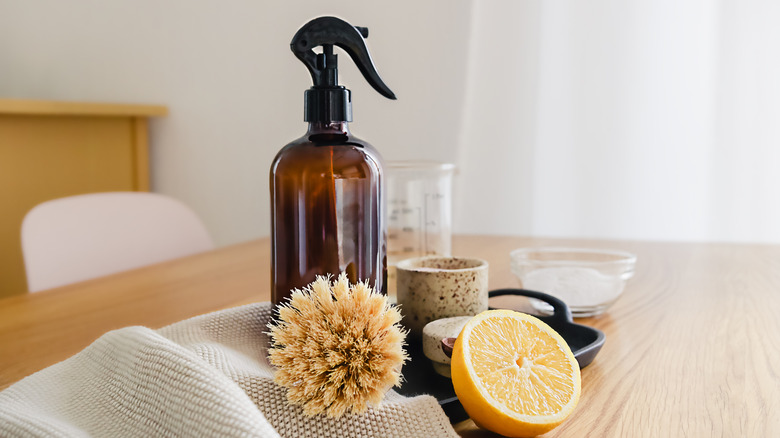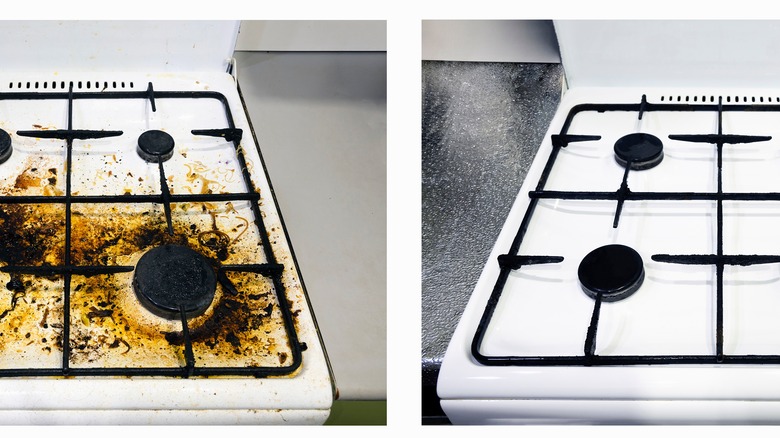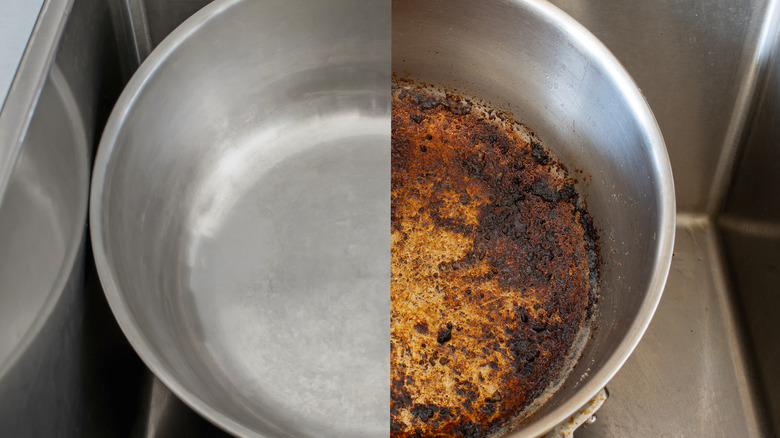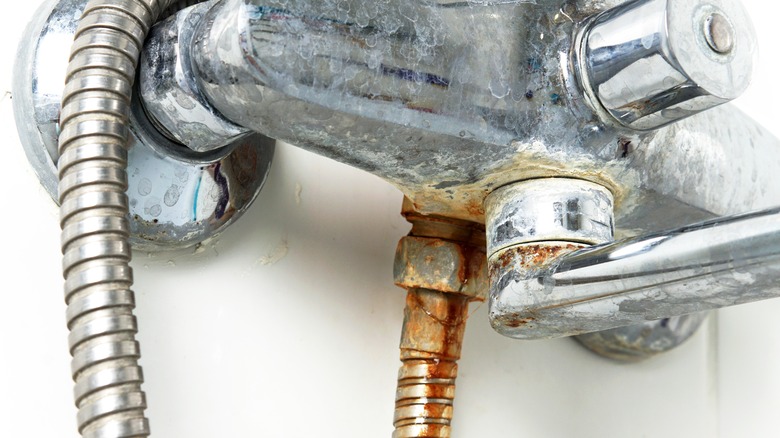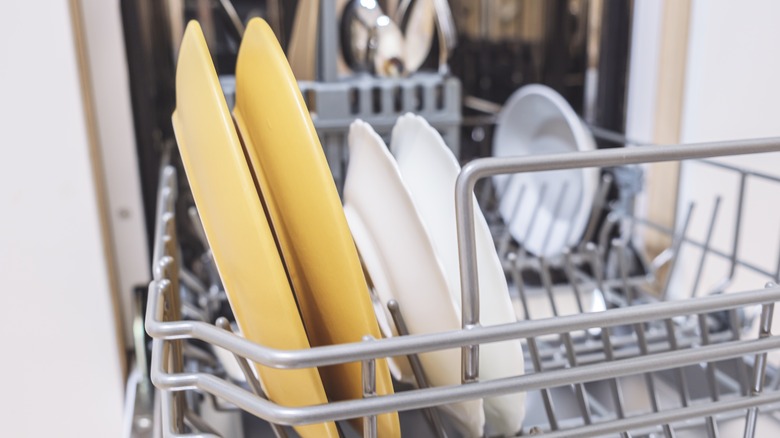5 Places In Your Home That You Should Be Cleaning With Vinegar
Vinegar is a highly effective cleaning solution that can be used in many different parts of the home. Vinegar is a fantastic remover of rust and grease from all kinds of different surfaces (via Fine Woodworking), and this makes it a versatile cleaning solution for use in the kitchen, bathroom, and in many other places around the house.
In many instances, a simple mixture of vinegar and water can be used to clear away streaks from glass and metal surfaces, grease buildup on appliances and floors, and grime and hard water deposits that collect throughout the home. The versatility of vinegar makes it a highly cost-effective solution to many different cleaning requirements that homeowners face on a routine basis. The House & Homestead reports that mixing vinegar and water solutions with a dash of essential oils can help add a layer of antimicrobial protection or enhanced scent additions to your surfaces.
1. Mirrors and windows
One of the most common household areas that homeowners can clean effectively with vinegar are glass surfaces. Glass picks up streaks and oils with ease, and a dirty mirror or window can be an unsightly component of any property. A streak-free shine is the goal for many homeowners when it comes to these glass surfaces. But glass cleaners can be expensive, and many options perform their job with varying degrees of success. Instead of relying on a commercial glass cleaning product, using a simple solution of vinegar and water can get the job done with surprising ease and cost-effectiveness (via Molly Maid).
It's possible to buy a spray bottle with one part vinegar and one part water solution already mixed together. With this spray, all you need to do is spray the glass surface and run a paper towel or cloth over the affected area in small circles until the liquid solution has been completely wiped away. What's left will be a completely streak-free shine. On particularly dirty surfaces, you may need to return with the spray bottle a second time in certain corners or segments of the surface, but this is all that's required to clean a mirror or window. It's also possible to make this solution yourself; it just requires equal parts water and vinegar. Adding this to a spray bottle or using a sponge to apply the solution provides a simple and highly effective cleaning option.
2. The stove
Your stove is another feature that can benefit from the cleaning power of vinegar. In the same way that a solution of vinegar and water can remove streaks and oils from glass surfaces, this mixture is also capable of cutting through tough grease that cakes onto your home's cooking surfaces (via Hello Lidy). A family that cooks often may see a significant buildup of hardened grease and other oily substances on their stove and backsplash. Vinegar and water act together as a significantly powerful solvent to lift stubborn oils and grease that have caked onto these surfaces.
Once again, there are a great many commercially available options for tackling this tough-to-clean surface. They make use of all types of different chemical solutions, but store-bought remedies for stove top cleaning are far more expensive than a simple vinegar and water mixture. Using this cost-effective approach to cleaning can save you a significant amount of money over the long run, and it can transform the way you budget in the immediate present while the cost of living has skyrocketed and forced homeowners to make difficult choices about where to leverage finite financial resources.
3. Aged pots and pans
Pots and pans can also benefit from the use of a vinegar solution. The acidity of vinegar provides a powerful rust and grease lifter, according to Fine Woodworking. Using vinegar and water or salt solutions helps eliminate stains on pots and pans that have developed a patina of grease, rust, and other caked-on debris.
Lifting burnt-on stains can be done in one of two ways. It's also worth noting that a combination of these approaches can be beneficial to eliminate this problem from your cookware. Stains inside the pan's cooking surface can be lifted by adding vinegar, allowing it to sit and get to work for a few minutes, and then rinse the pan. Then fill the pan with equal parts vinegar and water and boil the liquid on your stovetop for about 10 minutes. Letting the solution cool back to room temperature and then cleaning the pan, as usual, should lift most or all of this hard-to-eliminate gunk from your cooking equipment, bringing it back to life (via eHow). Another approach is to use the soaking method. Placing an affected pan or pot fully submerged in a vinegar and salt solution overnight will go a long way to lifting this tough stain.
4. Showerheads and faucets
Shower heads, sink faucets, and any other metal components in your kitchen or bathroom exposed to water regularly can develop a serious limescale problem. Limescale is a buildup of hard water deposits within the tap water at your home (via Halcyan Water). Over time, the mineral makeup of your tap water can develop into these hard elements that stick to surfaces like faucets and shower heads. Pure vinegar is the way to go here. Using a regular bottle of storebought white vinegar, you can submerge any of these metal elements directly into the vinegar overnight to weaken the hard water deposits on their surface. For features that can't be removed from their position, placing them in a bucket full of vinegar is the easiest way to achieve this effect. Alternatively, if you can't remove the item in question, using a watertight bag to bring the vinegar up to the surface will give you the same outcome (via Dutton Plumbing).
The acidity of the vinegar will immediately start to eat away at the hard water deposits on your showerhead, but leaving it submerged in the vinegar overnight is the best approach when seeking to totally clear away these problem spots that look terrible and can affect the performance of your showerhead and other water features in the bathroom or kitchen.
5. Your dishwasher
Lastly, your dishwasher can be cleaned with vinegar as well. Eating Well reports that adding a cup of vinegar to the top rack and then running the wash cycle with the remainder of the unit empty is all it takes to clean away grime and grit from within the unit. Alternatively, pouring a cup of vinegar into the base of your dishwasher and then running the wash cycle will achieve the same end. This is a highly effective way to clear away any hard water deposits, oil and grease buildup, or smells that may have developed in the dishwasher. Once again, vinegar's high acidity plays an important role in making cleaning easy and highly effective throughout the home. The metal surfaces within your dishwasher act like magnets for all kinds of problems that can develop, but vinegar easily strips these issues away when mixed with hot water, time, or both.
It's important to note that vinegar may be too harsh for certain plastic parts of many standard dishwasher models. Therefore, it's a good idea to look at your dishwasher's user manual before using any vinegar in the interior compartment. However, it's likely that simply removing any plastic components from the inside of this machine will allow you to utilize this easy solution to many common dishwasher cleaning problems without the worry of damaging some of the parts.
